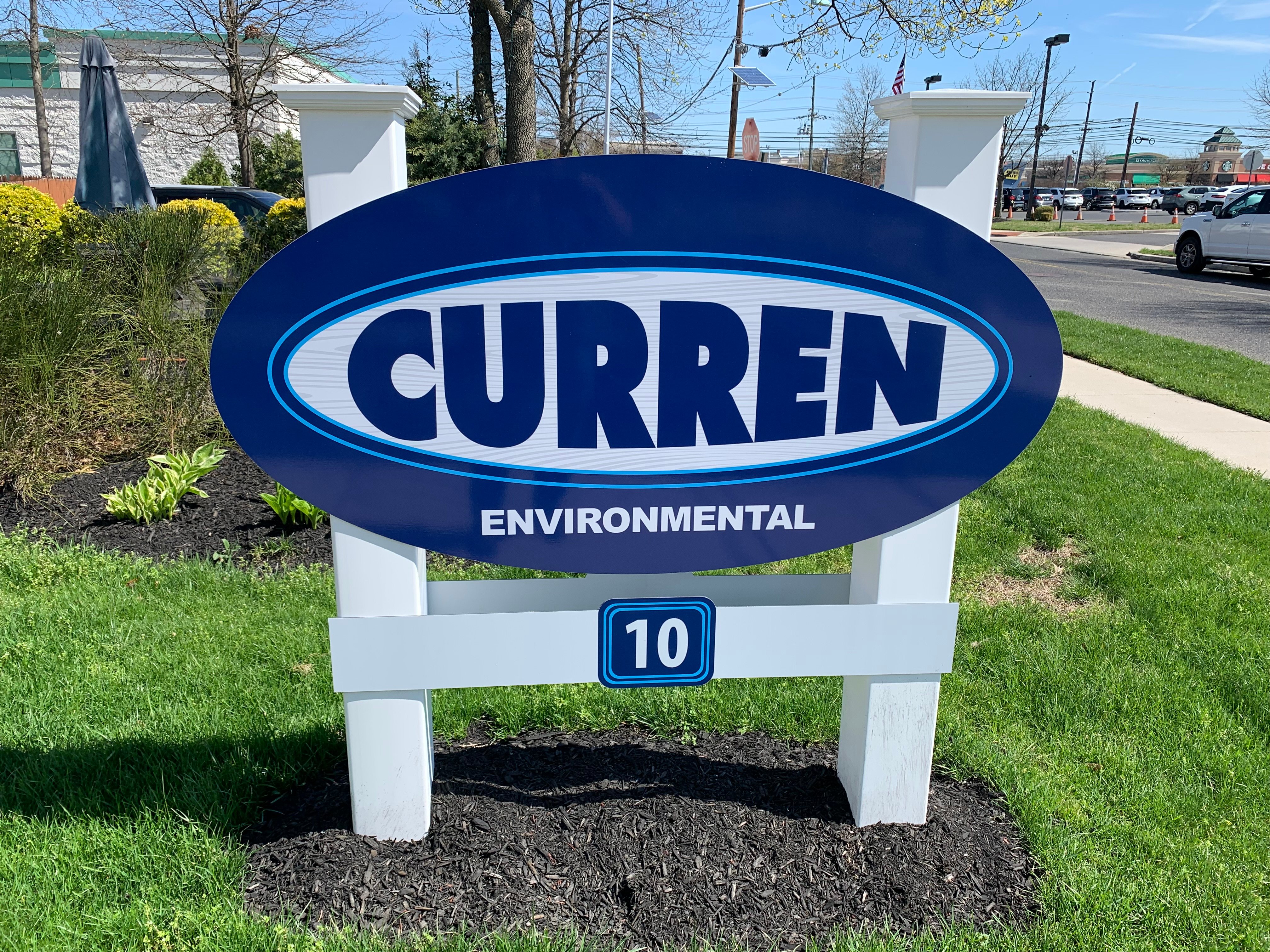NJ Lead Safe Law FAQ
January 12, 2026 Update
NJ must comply with Federal regulations and standards. The EPA significantly updated its lead dust standards in late 2024 and early 2025, making them much stricter reducing floor dust limits from 10 µg/ft² to 5 µg/ft². What this means for NJ landlords is if you have to acquire dust wipe samples the standard is 50% stricter than it was previously
New Jersey’s Lead law P.L.2021, c.182. 5. came into effect in July of 2022 and regulates pretty much all rental units in New Jersey (there are some exceptions). The law is commonly referred to as New Jersey's Lead Safe Law.
All lead safe certifications expire AFTER 3 Year
If you received a cert in 2022, you are required to obtain a new one before the exiting one expires.
Environmental Experts since the 1990s we answer some of the most common questions regarding New Jerseys Lead safe law for rental units.
When Did New Jersey’s Lead law P.L.2021, c.182. 5. go into effect?
The law became effective on July 22, 2022; it was enforceable as of that date.
NJ Lead Law 2025 Update
Lead Law Update, the individual requirements for municipalities changed on February 14, 2025.
The law updates removed some towns from having to perform dust wipe sampling, while requiring some towns that were visual only to now also perform dust wipe sampling.
10 towns (1.8%) moved from visual inspection to dust wipe sampling and 43 towns (7.6%) moved from dust wipe sampling to visual inspection. Only 9.4% of towns had a change in methodology and most of those moved to an easier, less costly methodology.
51 towns are now dust wipe, down from the current 84.
The data obtained from the implementation of the NJ Lead Safe Law has showed a steady decline in municipal EBLL rates through FY2023, which is why incorporating the most recent data shifted the methodology to visual inspection in so many towns.
A town requiring a dust wipe as part of the lead safe inspection is based on Department of Health data, averaged over 3 years.
Clearly compliance with the NJ Lead Safe Law is a moving target, call the lead experts 856-858-9509
September 2024 Lead Law Update
-
Lead safe certificates are now good for 3 years.
-
The law does not say landlords must supply the certificate to existing tenants. New tenants must get a copy.
-
Inspections were always interior and tenant accessible areas in the main structure. The amendment now is saying detached garages are part of the inspection, where previously they were not.
-
New deadline is July 22, 2025, or earlier if tenant vacates.
-
Lastly tenant common areas are now their own inspection.
-
For example: A 4 unit building undergoes a lead safe inspection. All 4 units pass for lead safe, but the common hallway does not. All tenants use this hallway to access their units. The law requires a common area inspection that operates on its own certificate with its own cycle. This means that you can pass all four units and fail the common area, which the owner will need to remediate.

The photo of the entrance vestibule is an area that requires it's own lead safe certification.
The reason it gets its own cert is that otherwise, it would need to be inspected each time one of the units is (assuming you tie the hallway to a unit). You see, an apartment can be where you live, but also the common hallway you use to access the apartment. Giving the hallway its own cert gives it its own inspection schedule.
Why as a landlord you do not want to fail.
The municipality shall deliver to the Department of Community Affairs a list identifying each dwelling unit inspected that was determined to contain a lead-based paint hazard. The DCA in turn must submit an annual report to the Legislature indicating the number of inspected dwelling units identified to have lead-based paint hazards. The report shall list the number of inspected dwellings and dwelling units identified to have lead-based paint hazards within each county.
Want to know how to pass
and
stay in compliance with NJ Lead Safe Law?
Call Curren Environmental
856-858-9509
What is New Jersey’s Lead law P.L.2021, c.182. 5. all about?
New Jersey lead law targets rental properties built before 1978 and requires that the individual units be inspected for lead paint hazards. This lead risk assessment has been required for large multi-unit rental properties for years and the New Jersey's 2022 lead law is really playing catchup to the requirement for lead inspection that other states have had for years.
The law requires an initial inspection by July 22, 2024, or upon tenant turnover, whichever is sooner.
The law went into effect on July 22, 2022, if a tenant leaves before July 22, 2024, you have to have a lead safe inspection at tenant turnover. This also gives landlords the opportunity to do a property walk through and address Maintenace issues, including paint.
If you have long term tenant that do not plan to vacate before July 22, 2024, you have to get your inspection before July 22, 2024, while the unit is still occupied.
The adverse health effects of lead have been known since Roman times. Lead paint was banned nationally in 1978, although other countries banned lead decades before the United States did, so anything we do is well behind other developed countries.
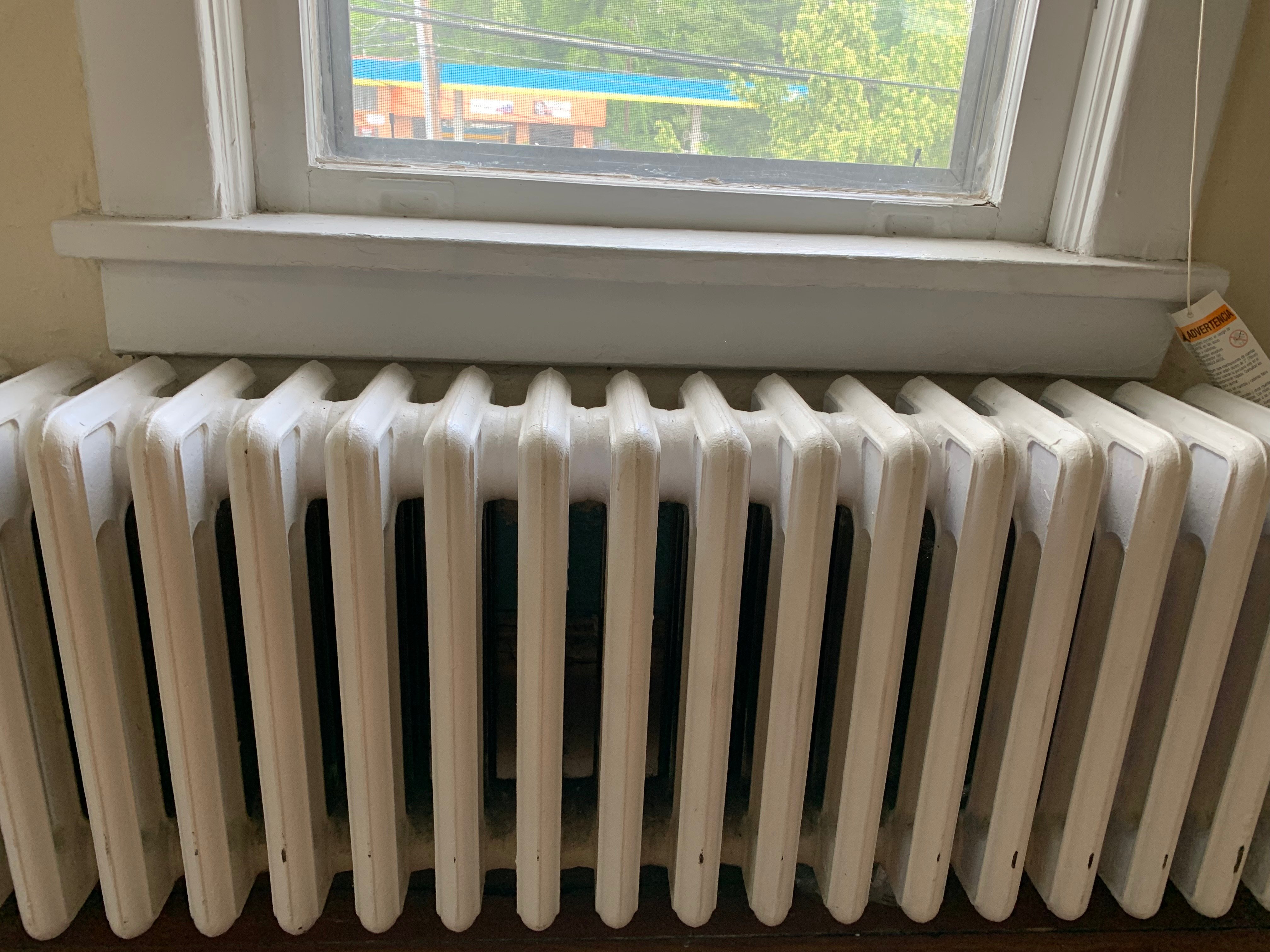
Are all rental properties regulated by the NJ Lead Safe Law?
Not every residential property is regulated by the law. A quick list of exempt units is below:
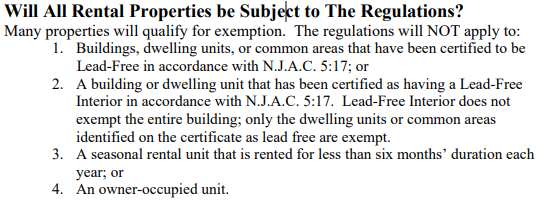
If a property is completely gutted and renovated, how does that property get exempted from the two-year certification?
Any property that undergoes renovation, and in the process of that renovation is certified to be lead-free, would be exempt from inspections pursuant to P.L.2021, c.182. In short, the property would need to have a lead-based paint inspection which is a surface-by-surface inspection of surfaces for lead paint. In short, you get everything tested for lead to prove there is no more lead paint. The current inspection assumes lead paint is present and evaluates for deteriorated paint as exposed lead paint (chips, dust) poses an injection and inhalation hazard.
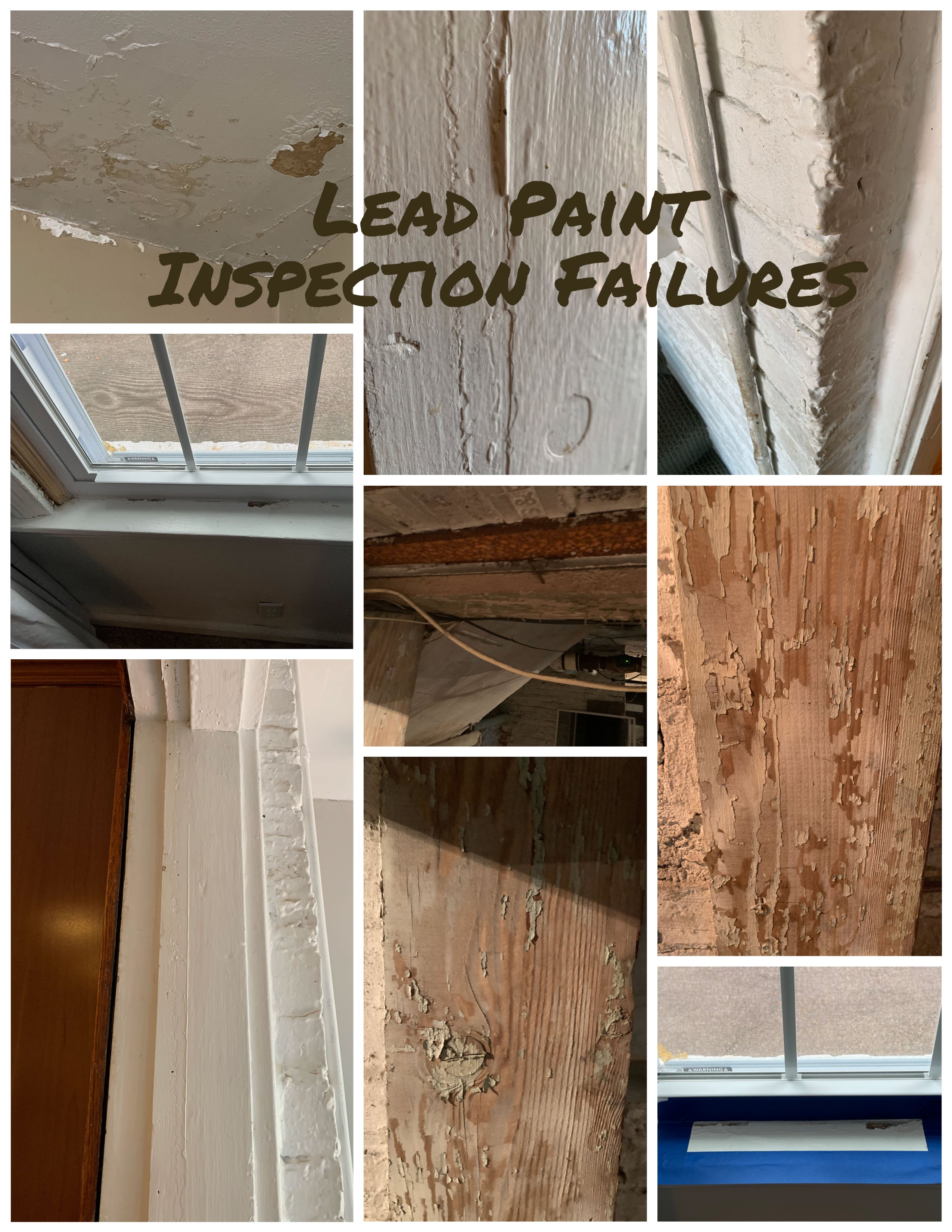
Some municipalities require visual lead assessment, and some require both visual and dust sampling. Where is the list for the municipalities?
The method of inspection depends on the DOH data on EBLL cases in the municipality; this is available online at Visual vs Dust Wipe Municipalities.
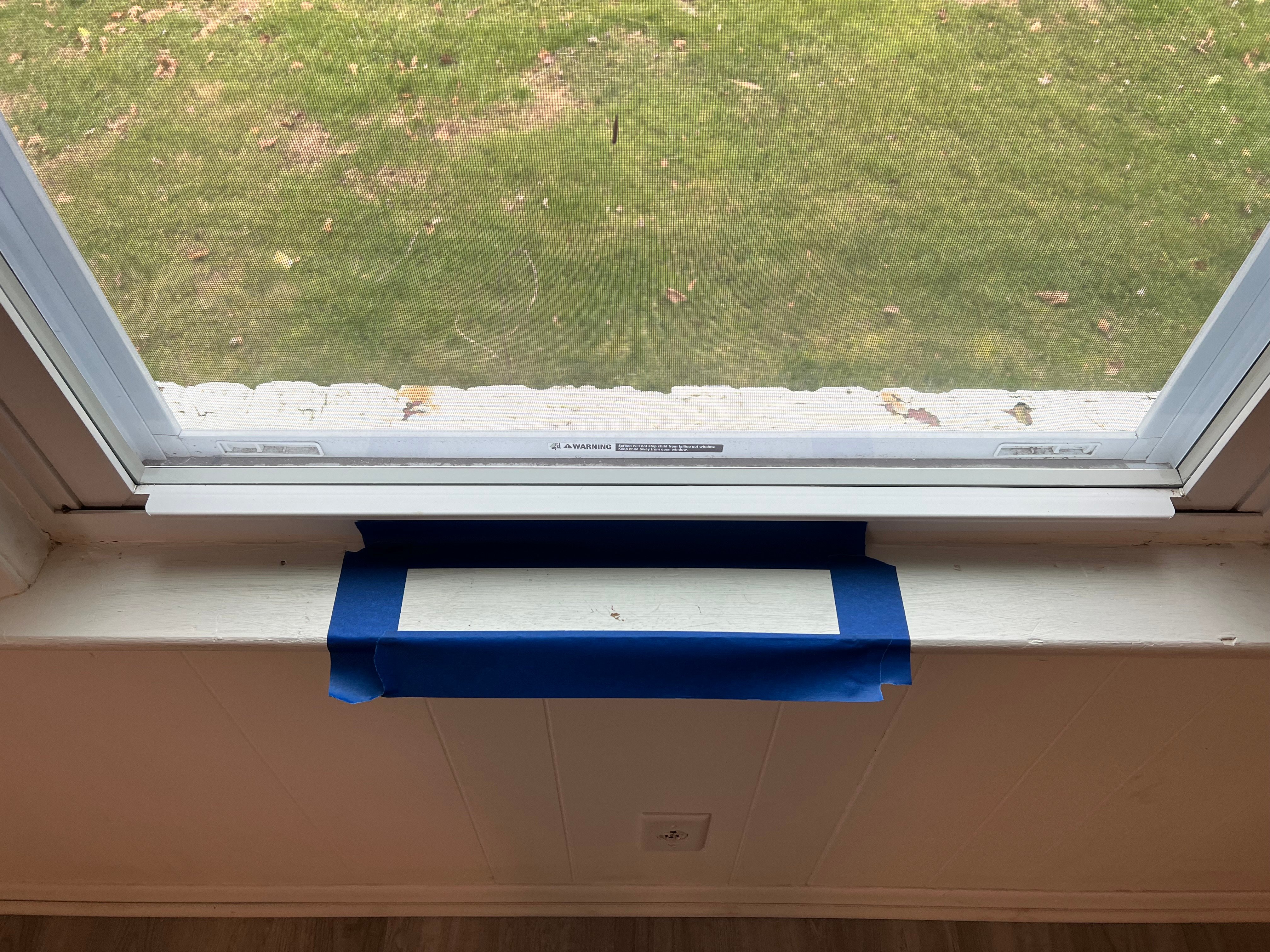
Can the municipality force an inspection if the tenant is still occupying, and we have not yet reached July of 2024?
Subject to subsection c. of this section, in a municipality that maintains a permanent local agency for the purpose of conducting inspections and enforcing laws, ordinances, and regulations concerning buildings and structures within the municipality, the permanent local agency shall inspect every single-family, two-family, and multiple rental dwelling located within the municipality at tenant turnover for lead-based paint hazards or within 3 years of the effective date of P.L.2021, c.182 (C.52:27D-437.16 et al.), whichever is earlier.
Effective date was July 22, 2022. So in general, under this law no. Although, there is another section that says if you find Pd in one unit, you can check other units in the building.
My understanding is the municipality is required to have the inspection performed, but must also allow the owner to undertake the inspection?
That is correct, the law places the burden on the municipality to ensure the inspection is completed. The municipality has to inform landlords of their obligation to get the lead safe inspection performed, when it is due and many are offering for a fee an inspection by municipal personnel.
My municipality has staff to complete the inspection, but I am in a town where I only need visual inspection, but the municipal inspector wants to do visual and wipe sample. Must a town do both visual and dust wipe?
The law allows municipal inspectors to perform visual and dust wipe even if the municipality is not a dust wipe town. The law reads as follows:
For dwellings located in a municipality in which less than three percent of children six years of age or younger tested have a blood lead level greater than or equal to five micrograms per deciliter, the inspection may be carried out through visual inspection, as explained in Section 3.3.4, below. However, these municipalities may elect to undertake dust wipe sampling, as explained in Section 3.3.5, below.
3.3.5 (p.15) says:
That said municipal inspectors are not required undergo the extent of training private inspectors do, think hours instead of a week. Many municipal inspectors are cautious and also test to be safe. A private inspector will be more knowledgeable and should cost less in this scenario as wipe samples are not required.
3.3.5 Dust Wipe Sampling Dust wipe sampling is collected by wiping representative surfaces, including floors (both carpeted and uncarpeted), interior windowsills, and other similar surfaces, and testing in accordance with a method approved by HUD. These samples must be undertaken properly to ensure that results are accurate. N.J.A.C. 5:17 contains requirements for dust wipe sampling. In addition, Appendix 13.1 of the HUD Guidelines for the Evaluation and Control of Lead-Based Paint Hazards in Housing provides the protocol for sample collection. It is recommended that the lead evaluation contractor or permanent local agency also perform a visual inspection when undertaking a dust wipe sampling.
Many municipalities choose to do wipe sampling in addition to visual because it provides a higher level of confidence that there is no health risk at the time of inspection. This is being performed in towns where only a Visual Inspection is required. Towns are doing this because attorneys and insurance carriers prefer it so the inspection is more thorough. Although dust wipe sampling adds cost when not required and it might pick up lead contamination from some source other than paint.
Why are some towns pushing for lead inspections when I still have time to complete the inspection?
Towns are tasked with enforcing the law and are subject to fine for non compliance. This is a relatively new law and municipalities were not given much guidance on how to enforce the law. I believe the assumption was that towns have records of rental properties within their boundaries and manage CO (certificate of occupancy) for these units, so they were best served to manage the lead safe inspections. Know that the law authorizes the DCA to fine towns for not enforcing the law but at least at this point the hope has been that the towns will do their best to put a program in place and “start” enforcing it.
Where does the NJ lead safe certification require inspection be performed in a rental unit?
The initial lead inspection including subsequent periodic lead-based paint inspection applies to interior spaces within dwellings. This is interpreted to include any common areas that tenants of a rental dwelling have access to, including hallways and basements, in two-family and multiple dwelling rentals. In short you are inspecting interior areas, exterior areas such as porches are not part of the inspection.
Since lead paint is no longer sold, why are owners required to have a reinspection of a property that is shown to not have any lead based paint? If there is no lead based paint in it now at the first inspection, there is no need for subsequent inspections as any new painting would not have lead in the paint.
Properties built before 1978 have a high likelihood of containing lead paint, stain, or varnish. The chart below is based on national data and provides the likelihood of lead-containing coatings being present. That said, the NJ Lead Safe law presumes there is lead coated surfaces and are most likely covered over by a non-lead-based paint and this providing a protective barrier. From that point of view, NJ requires a visual inspection, which is a lead paint risk assessment. You are not testing surfaces for lead. If you believe there is zero lead-based coatings in a dwelling you need to perform a Lead-Based Paint Inspection. Lead Based Paint Inspections entail onsite testing of surfaces for lead; you know within seconds if a surface has a lead coating. A typical home would have several hundred tests performed of all different surfaces. If you are 100% devoid of lead, you can receive a Lead Free certification, exempting you from future lead testing.
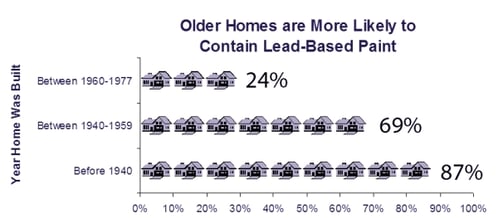
What qualifies as Lead-safe is it a dust wipe inspection or visual?
Either a visual assessment or dust wipe inspection can result in a lead-safe certification. The method of inspection for each municipality is available online at https://www.nj.gov/dca/codes/publications/pdf_lead/doh_lead_data_insp.pdf.
For rentals that require dust wipe sampling, must every room in the home be tested including windowsills and floors, that need to be wipe sampled in every room?
Yes, floors and windowsills need to be tested throughout the entirety of the dwelling. The minimum number of dust samples is 8, plus 1 quality control for a total of 9 dust wipe samples.
Municipalities that require dust sampling should be expected to have a higher inspection cost.
Since dust wipe sampling involves collecting samples and having said samples analyzed at a laboratory you will incur higher inspection costs. This is due to the additional time to acquire samples, lab fees and ultimately this data being reviewed, and a report drafted explaining the results, reports don’t write themselves.
What if a dust wipe sample comes back positive?
First, keep in mind that all the lead inspections are actual Lead Paint Risk Assessments. When wipe sampling is performed, you are evaluating (TESTING) for LEAD HAZARDS, every inspection is visua,l which assesses for deteriorated paint which is considered a lead paint hazard.
The following lead dust levels resulting from a lead screening shall indicate that a full evaluation shall be recommended in the report produced by the inspector/risk assessor:
1. Floor wipes at or in excess of 10 [mu]g/square foot;
2. Window sill wipes at or in excess of 100 [mu]g/square foot.
For floors, a Lead Hazard exists if your wipe sample results are equal to or greater than 10 [mu]g/square foot;
For Interior window sills--equal to or greater than 100 [mu]g/square foot;
And Window wells -- equal to or greater than 400 [mu]g/square foot, which are not tested as part of the lead safe law.
If you have a lead paint dust hazards (And it's not hard as the levels are very low) the lead-based paint hazards must be appropriately addressed. Technically landlords are to hire a company trained in stabilizing paint in a lead safe fashion, these companies would have an RRP designation. EPA RRP Website And yes you will need post-remedial dust wipe sampling, and if post-testing fails, then yes you must continue to remediate/repair and post-test to ensure success in remediating the lead paint hazard.
Then a post remediation or interim control inspection is required within 60 days of the initial inspection.
4.4.0 Post-Remediation Inspection After remediation has been completed, whether through interim controls or abatement, the municipality or lead evaluation contractor must perform an additional inspection within 60 days of the initial periodic lead-based paint inspection to ensure there are no further lead-based paint hazards.
What are the lead dust wipe standards?
EPA proposed new lower lead dust wipe clearance standards in 2020 they went into effect in 2021, New Jersey is using these standards for the lead safe law dust wipe sampling.
Floors 10 mg/ft2, you exceed if you are 10 or higher
Window sills 100 mg/ft2 you exceed if you are 100 or higher
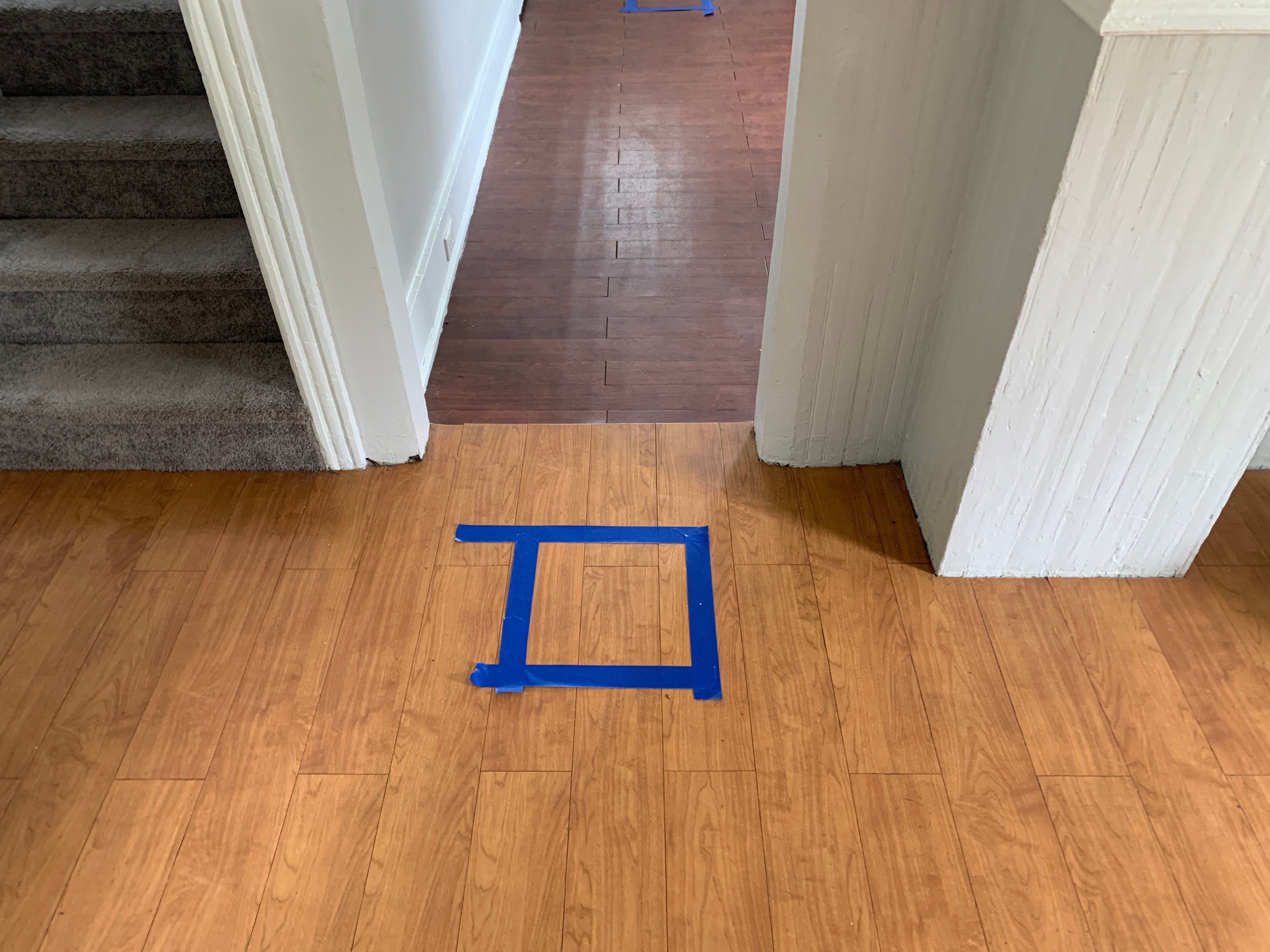
Prior standards were higher, so the standard has gotten stricter, to protect children.
What happens if the lead safe inspection fails? Visual inspection fails, aside from owner who gets notified? Who is responsible for notification owner or inspector? If wipe sample fails, again who gets notified? Who is responsible for notification owner or inspector?
The law says: (1) If a lead evaluation contractor or permanent local agency finds that a lead-based paint hazard exists in a dwelling unit upon conducting an inspection pursuant to this section, then the owner of the dwelling unit shall remediate the lead-based paint hazard by using abatement or lead-based paint hazard control methods, approved in accordance with the provisions of the "Lead Hazard Control Assistance Act," P.L.2003, c.311 (C.52:27D- 437.1 et al.). Upon the remediation of the lead-based paint hazard, the lead evaluation contractor or permanent local agency shall conduct an additional inspection of the unit to certify that the hazard no longer exists.
Bottom line, there is no government notification in that section but, but the property owner has to fix things: If the tenant is occupied during lead safe inspection and it fails, tenant is notified and must be managed by owner.
Beginning on the effective date of P.L.2021, c.182 (C.52:27D-437.16 et al.), property owners shall: (1) provide evidence of a valid lead-safe certification obtained pursuant to this section as well as evidence of the most recent tenant turnover at the time of the cyclical inspection carried out under the "Hotel and Multiple Dwelling Law," P.L.1967, c.76 (C.55:13A- 1 et seq.), unless not required to have had an inspection by a lead evaluation contractor or permanent local agency pursuant to paragraph (1), (2), or (3) of subsection c. of this section; (2) provide evidence of a valid lead-safe certification obtained pursuant to this section to new tenants of the property at the time of tenant turnover unless not required to have had an inspection by a lead evaluation contractor or permanent local agency pursuant to paragraphs (1), (2), (3), and (4) of subsection c. of this section, and shall affix a copy of such certification as an exhibit to the tenant’s or tenants’ lease; and (3) maintain a record of the lead-safe certification which shall include the name or names of the unit’s tenant or tenants, if the inspection was conducted during a period of tenancy, unless not required to have had an inspection by a lead evaluation contractor or permanent local agency pursuant to paragraphs (1), (2), (3), and (4) of subsection c. of this section.
In a duplex, if one unit has a tenant turnover and fails, but the other unit has not yet had a tenant turnover, does it then need to be tested as well?
The answer is yes, P.L.2021, c.182 requires the other unit to be inspected pursuant to Section 1.g(3). The logic is both units are likely in the same condition so the second unit requires inspection even if it is occupied.
What if a property has long term tenants (years) and the lead inspection is performed during tenant occupancy, and the inspection fails? What happens to the tenant?
First, the owner is responsible for the tenant. This in in the DCA Guidance document.
I am being told that test may occur outdoors, such as a porch railings and windows, etc. Is that true?
Porches are typically not included. I would be worried if THE OUTDOOR AREA becomes more like interior space. The law says the periodic lead-based paint inspection applies to interior spaces within dwellings. This is interpreted to include any common areas that tenants of a rental dwelling have access to, including hallways and basements, in two-family and multiple dwelling rentals.
Can the abatement take place during occupancy, or must the unit remain vacant until the lead abatement is completed?
This determination is made by the lead abatement contractor, not the inspector. So bottom line you want your unit in the condition to pass or else you risk having to manage the tenant which can include temporary relocation. There are some remediations that can be done during tenant occupancy;
Is the inspection inside and exterior?
As per the law: periodic lead-based paint inspection applies to interior spaces within dwellings. This is interpreted to include any common areas that tenants of a rental dwelling have access to, including hallways and basements, in two-family and multiple dwelling rentals.
Only interior portions must be included for all building components. The floor plan below shows the rooms inside a rental unit that would be included in a lead paint risk assessment.
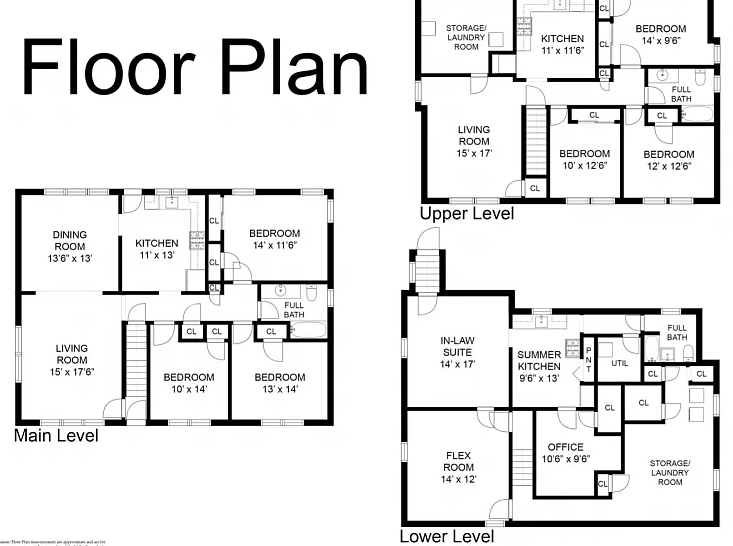
If you inspect inside what parts of a window get inspected?
The visual training that municipal inspectors must take show the evaluation of windows, sills and window wells viewed from the inside of buildings. It is reasonable to include parts of the window that is accessible from the interior of the building.
So if you have old wood double hung windows, in an old home and you have deteriorated paint that you can access from inside the structure, well that that would be a failure.
What is a visual inspection and how does a visual inspection determine if lead-based paint is present?
Visual is just as it sounds a visual evaluation of surfaces for deteriorated paint which would be a lead paint hazard. Deteriorated Paint is when it is peeling, chipping, chalking, or cracking. Tack and nail holes, small hairline cracks, and other surface imperfections may not be considered deteriorated paint; If you want the full scoop review this website. Section 3.3.3, Visual Inspections, of the Department’s Guidance Document, available online https://www.nj.gov/dca/codes/publications/pdf_lead/doh_lead_data_insp.pdfl.
The photo below represents a lead paint hazard as the paint has lost integrity and is peeling off the door frame.
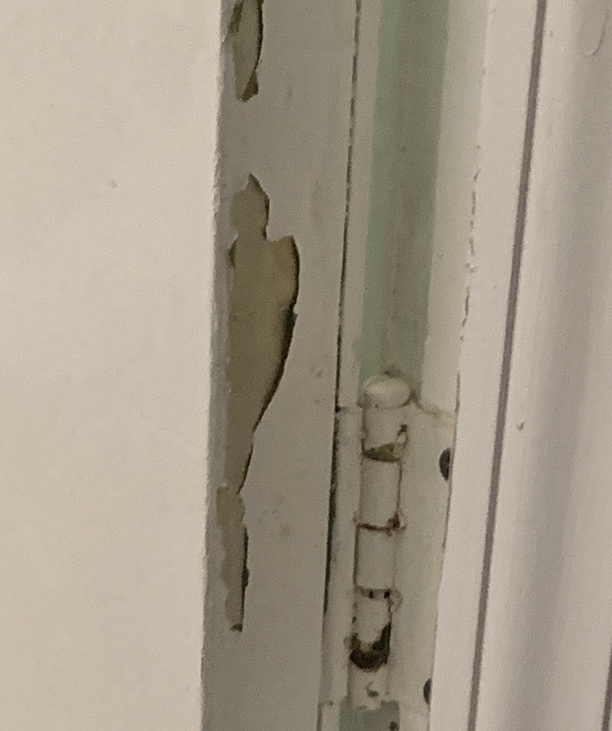
Who issues penalties for noncompliance?
New Jersey passed the lead law and has thrown enforcement at the individual municipalities. Part of the thought process behind municipal control is they have a record of what properties in a given town are rental vs owner occupied.
Municipalities can issue penalties against property owners for failure to comply with the requirement of P.L.2021, c.182. The law established municipal authority to issue penalties and could be cited in any violation notice. The Department of Community Affairs also has the authority to issue penalties against municipalities for failure to comply with the law.
What are the penalties for noncompliance?
5:28A-4.1 Municipal enforcement
(a) A municipality, or its permanent local agency, shall be authorized to conduct investigations and issue penalties in order to enforce a property owner's failure to comply with this chapter.
- The owner of the dwelling shall first be given a period of 30 days to cure any violation by conducting the required inspection or initiating any required remediation efforts.
- If the owner of the dwelling has not cured the violation within that time period, they shall be subject to a penalty, not to exceed $ 1,000 per week, until the required inspection has been conducted or the remediation efforts have been initiated. Remediation efforts shall be considered to be initiated when the dwelling owner has hired a lead abatement contractor or other qualified party to perform lead-hazard control methods.
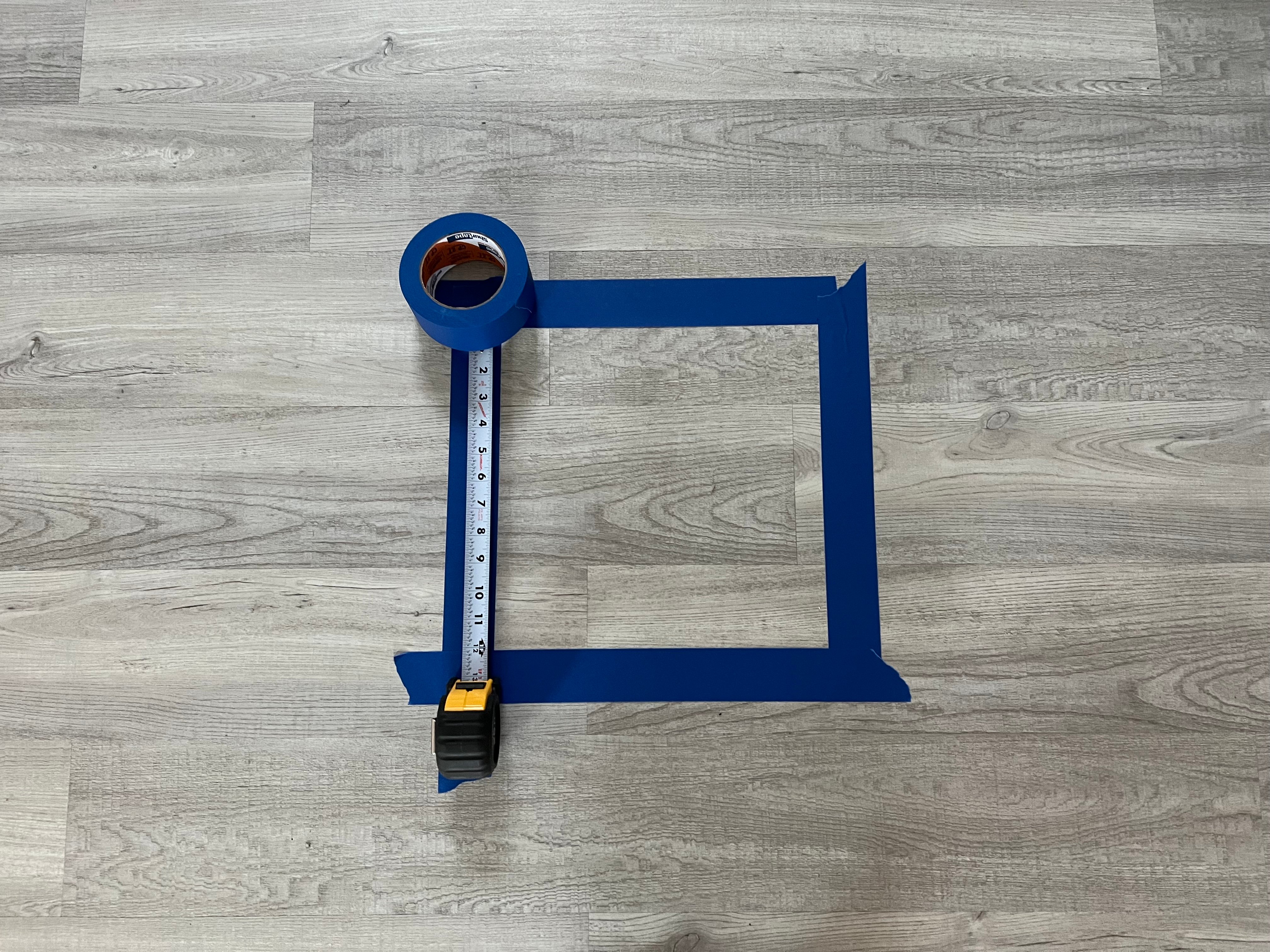
Can a property owner of a rental unit appeal the violations to the Construction Board of Appeals?
Because it is not a Uniform Construction Code matter, the violations would not be appealable to the Construction Board of Appeals.
Why is the inspection cycle every three years if the lead-free certificate expires in two years?
This changed in September of 2024 to allow the certificate to last 3 years.
OLD ANSWER A lead-safe certification is good for two years no matter what happens with the tenancy.
After two years, property owners have to get a re-inspection if their tenant leaves.
If the tenant doesn’t leave after three years from the date of the certification, the property must be inspected, and a new lead-safe certification will be issued. Then the cycle starts over.
The language of the law requires that the initial inspection must be undertaken by July 22, 2025.
In short, you expect a unit to suffer wear and tear, which is the driver for perpetual inspections.
If a tenant moves out within 2 years of the issuance of a Lead Safe Certificate, do I need a re-inspection?
No. A lead-safe certification is good for 3 years no matter what happens with the tenancy. After two years, property owners have to get a re-inspection if their tenant leaves. If the tenant doesn’t leave after three years from the date of the certification, the property must be inspected, and a new lead-safe certification will be issued.
The certification is valid for 3 years; in that three-year period, dwellings are exempt from tenant turnover inspections.
Is there a government fee associated with the lead paint inspection?
There is a $20 fee per unit that the municipality is supposed to charge property owners. They in turn send the monies to DCA to be used as part of the lead program. As of November 2022, there isn’t even an account at the State of New Jersey to place these funds, so the program which has good intentions is a work in progress.

Who is ultimately responsible for collecting the $20 Fee for the lead hazard control fund, the contractor doing the inspection or the municipality?
The municipality is responsible for collecting this fee and depositing it into the Lead Hazard Control Assistance Fund. In general, DCA would be expecting to see that each municipality had x # of inspections done, and x ($20) was sent to the fund.
Who is responsible for maintaining a record of certification with tenant names?
The municipality is responsible for maintaining a record of lead-safe certifications issued. This information must also be maintained by the landlord, along with tenant information.
For a sale of a one- or two-family dwelling, does the lead inspection occur as part of the CCO process for the sale or only if the new owner decides to rent the home out?
New Jersey’s 2022 lead law is not connected to the sale of a property or associated with a CO. There is no inspection requirement for home sales pursuant to the Law.
Lead Law Questions?
888-301-1050
What happens if the landlord states that they want to take care of the inspection on their own, but then don't complete it by the deadline?
The regulations allow for the municipality to prohibit a property owner from hiring a private lead evaluation contractor and instead receive an inspection conducted by the municipality’s lead inspector in situations where the property owner has failed to have an inspection performed.
In a duplex, if one unit has a tenant turnover and fails, but the other unit has not yet had a tenant turnover, does it then need to be tested as well?
Yes, P.L.2021, c.182 requires the other unit to be inspected pursuant to Section 1.g(3). The law requires every rental unit built before 1978 to be inspected.
Are college suites and college apartments considered exempt under the “seasonal rentals” as the students occupy the dwelling for less than 6 months in the 2022 Fall semester and less than 6 months for the 2023 Spring semester?
The exemption for seasonal rental dwellings contained within P.L.2021, c.182, only covers seasonal rentals which are rented for less than six months in a calendar year. As such, any college apartments or suites that are occupied for more than six months during the year must be inspected pursuant to the Law.
Is there registration that keeps track of single- and two-family homes that are rented?
New Jersey does not keep track of these properties. Although municipalities are required to maintain one- and two-unit rental dwelling information pursuant to N.J.A.C. 5:29.
Can a municipality simply adopt a local ordinance to make the homeowner have the inspection performed by a licensed lead evaluation contractor and then submit it to the municipality?
No. While the Law allows landlords/owners to hire their own lead evaluation contractors, it does not allow the municipality to require such.
Can municipalities enforce owners to hire their own evaluator?
No. It must be the owner’s choice.
Can a municipality choose to hire a contractor if there is an agency that can perform the inspections?
No, the law requires municipalities that maintain a permanent local agency to perform the inspections. This may include the use of shared services agreements with other municipalities or county agencies.
The Law does not require municipalities to adopt an ordinance for this Law, and the lead-safe certification is available online at https://www.nj.gov/dca/divisions/codes/resources/leadpaint.html.
Does the person in the municipality have to be certified in checking the visual inspection?
Yes, the inspector performing visual assessments must complete the HUD visual assessment certification training. Practically speaking there are slim odds municipalities will have staff that are certified for lead risk assessments. Training is 40 hours with 3rd party testing required to obtain a license, it will be a stretch for municipal inspectors to want to have this training and the burden of performing the inspections.
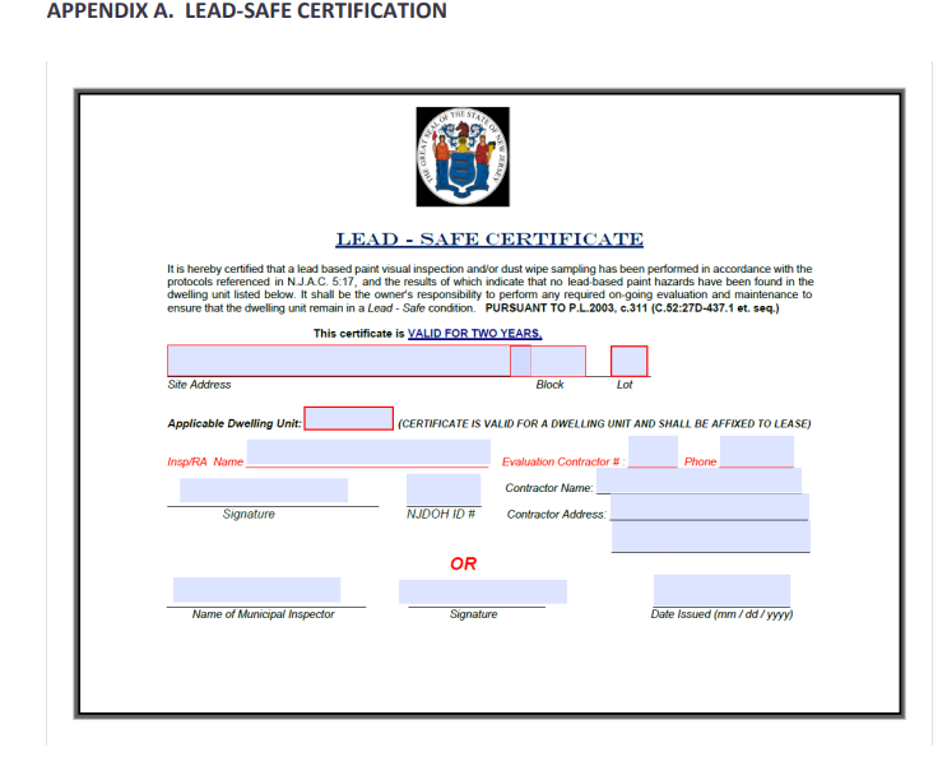
Does DCA need a copy of the lead-safe/lead-free certificate for their records, or should the municipality keep those?
Funny that although DCA is behind the rules they are not requiring the paperwork to be sent to them. The municipality must maintain the lead-safe certifications for their records. The DCA can ask for copies of these records should there be a need to examine compliance information throughout municipalities.
Does the tenant get a copy of the lead safe certification?
Yes the tenant is supposed to get a copy of the lead safe certificate so they will know they are living in a lead safe environment. But if you inspect and obtain a lead Safe cert the existing tenant is not required to receive a copy, but new tenants are required. Although anyone can request a copy from the municipality.
Beginning on the effective date of P.L.2021, c.182 (C.52:27D-437.16 et al.), property owners shall: (1) provide evidence of a valid lead-safe certification obtained pursuant to this section as well as evidence of the most recent tenant turnover at the time of the cyclical inspection carried out under the "Hotel and Multiple Dwelling Law," P.L.1967, c.76 (C.55:13A- 1 et seq.), unless not required to have had an inspection by a lead evaluation contractor or permanent local agency pursuant to paragraph (1), (2), or (3) of subsection c. of this section; (2) provide evidence of a valid lead-safe certification obtained pursuant to this section to new tenants of the property at the time of tenant turnover unless not required to have had an inspection by a lead evaluation contractor or permanent local agency pursuant to paragraphs (1), (2), (3), and (4) of subsection c. of this section, and shall affix a copy of such certification as an exhibit to the tenant’s or tenants’ lease; and (3) maintain a record of the lead-safe certification which shall include the name or names of the unit’s tenant or tenants, if the inspection was conducted during a period of tenancy, unless not required to have had an inspection by a lead evaluation contractor or permanent local agency pursuant to paragraphs (1), (2), (3), and (4) of subsection c. of this section.
NJDOH states "Important: In order to perform lead inspections and risk assessment in NJ, certified lead Inspector/Risk Assessors must be employed by a Lead Evaluation Contractor licensed by the NJ Department of Community Affairs." Does this preclude my staff members from conducting the inspection since we need to do dust wipe sampling?
It does not; the NJDOH regulations apply in situations where a child has been confirmed to have an elevated blood lead level. In addition, DCA’s regulations exempt municipal staff from the requirements for licensure within N.J.A.C. 5:17-2.1. In municipalities that must inspect via dust wipe sampling, HUD/EPA Dust Wipe Technician Certification is required for any inspector responsible for performing inspection pursuant to P.L.2021, c.182. 63.
Dust wipe sampling requires HUD/EPA Dust Wipe Technician certification. It is recommended (but not required by the law) that municipalities have a minimum of one staff person be certified as lead inspector/risk assessor, in accordance with Department of Health requirements within N.J.A.C. 8:62.
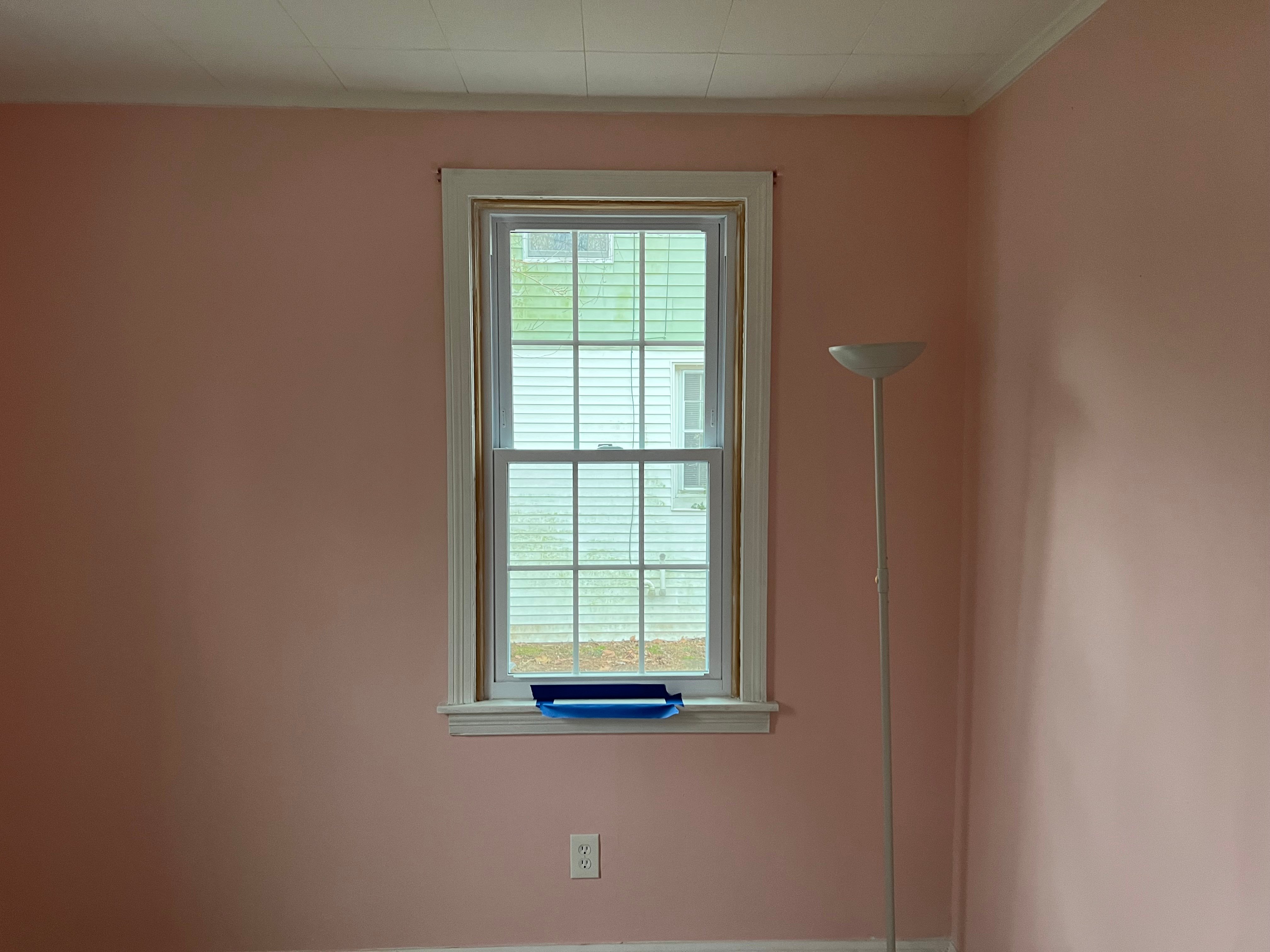
Can the landlord obtain the appropriate certifications to inspect or assess their own property or are they required to hire an outside firm?
Clearly bias would be present if an owner inspected their own property (even if the owner was a licensed lead inspector) The law does not allow for self-certification. Landlords are allowed to hire a lead evaluation contractor.
Does NJDEP, Department of Health or The Department of Community Affairs certifies lead evaluation contractors and remediators (lead abatement)?
The DCA certifies the firms that perform lead evaluation and abatement work, and DOH licenses individual workers, including LI/RAs and lead abatement workers. This is one area where NJDEP does not have involvement unlike oil tanks.
When you go to the HUD web site for the visual training there is a note that says, "This course will not qualify you to perform clearance sampling or lead-based risk assessments." Does this training still allow us to perform the visual inspection required by this new law?
Yes, because the inspection required by P.L.2021, c.182, is not a lead inspection/risk assessment and is not a clearance test, the HUD visual assessment training is all that is needed for municipal inspectors to perform visual assessments in accordance with the Law. Something you must understand the New Jersey lead law presumes lead paint is present in rental unit built before 1978.
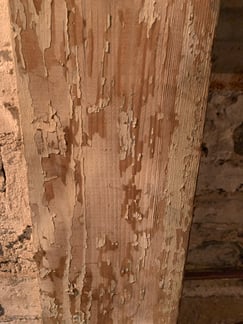
When I am looking to hire someone to perform the lead paint risk assessment, what do I need to know?
Whoever is performing the inspection must either be employed by a permanent local agency or by a lead evaluation contractor licensed by the DCA. Independent dust wipe technicians cannot provide the necessary inspection pursuant to P.L.2021, c.182. Lead Risk Assessors and Lead-Based Paint Inspectors in short, have more training (40 hours) as opposed to a dust wipe technician, which is a lower-tier inspection category with less training.
Is water testing required as part of the law?
This law is only applicable to lead-based paint; it does not take into account other sources of lead exposure.
Ok let’s say we have a lead paint hazard and abatement/remediation is required, do we need a permit?
Abatement work requires a Uniform Construction Code permit; interim controls do not.
Can the owner or landlord implement interim controls before an inspection? Can an owner and landlord do the interim controls themselves, and do they need a RRP certification, or do they need to use a licensed contractor?
Landlords and tenants can use lead-safe maintenance practices in between inspections. Information for lead-safe maintenance is available on the Department’s website: https://www.nj.gov/dca/divisions/codes/publications/pdf_bhi/leadsafe_maint_for_tenants.pdf. Interim controls are only performed as a result of a lead-based paint inspection; RRP certification is not required for individuals performing work in their own unit. Any contractor utilized to perform interim controls would be required to be RRP certified.
Since interim controls are short-term, what’s the point of implementing interim controls?
Interim controls are often appropriate when the dwelling is structurally sound, and the only issue is deteriorating paint, because this allows for the issue to be addressed without the expense of an abatement. In short interim controls are cheaper.
What if a property fails a visual inspection?
The owner must address the deteriorated paint, typically through interim controls and the unit must be reinspected and wipe samples obtained.
Wipe samples are required after any repair or remediation. So failing the initial inspection is bad, as it causes the landlord to incur additional expense to pass, this added expense is the reinspection and wipe samples that are now required.
5:28A-2.5 Remediation
(a) Where a lead-based paint hazard exists in a dwelling, the owner shall remediate the hazard by using either abatement or interim controls. The owner shall choose the appropriate remediation mechanism.
(b) Interim controls shall be performed, in accordance with the requirements of the United States Department of Housing and Urban Development at 42 U.S.C. § 4851b and detailed within the HUD Guidelines for the Evaluation and Control of Lead-Based Paint Hazards in Housing.
(c) Abatement work shall be performed in accordance with the requirements in the Lead Hazard Evaluation and Abatement Regulations, N.J.A.C. 5:17.
(d) Any relocation of tenants required pursuant to a remediation shall be undertaken, in accordance with applicable law.
(e) Upon conclusion of the remediation, the following procedure shall be followed:
- If the owner utilized interim controls for remediation, the lead evaluation contractor or permanent local agency shall conduct an additional inspection within 60 days of the initial inspection by using dust wipe sampling. If the inspections shows that the hazard no longer exists, the lead evaluation contractor or permanent local agency shall certify the unit as lead-safe on the form prescribed by the Department . The certification shall be valid for a period of two years from the date of issuance; and
- If the owner utilized abatement for remediation, and a lead abatement clearance certificate has been issued by the local enforcing agency in accordance with N.J.A.C. 5:17, then the lead-free certificate issued at the final clearance inspection shall exempt the dwelling from future periodical lead-based paint inspections
What is LEAD-BASED PAINT HAZARD?
What feedback are you receiving from landlords regarding compliance with the NJ Lead Safe LAW? How are fines managed with violations of the Lead Safe Law?
-
Some landlords are talking of selling since NJ makes being a landlord difficult, even before this law. Some feel it is just another hoop to jump through.
-
Some people who have done extensive renovations and applied for lead-free certifications. Once obtained, they view the property as being more valuable when they sell.
-
Many properties pass without issue, older properties tend to have a higher failure rate simply due to many layers of paint and some areas will have a paint failure.
-
A common failure complaint is that the landlord painted the entire unit XXXX years ago and cannot understand how the paint is now damaged.
-
Long-term tenants also have a higher failure rate simply due to living in the space can damage paint and most tenants are not inclined to make repairs as they are tenants, not owners.
-
Landlords who do not comply with the regulation are subject to a fine by the municipality at no more than $1,000/week and have 30 days to address any violation. So the penalties are at the discretion of the individual municipality and having dealt with a many different municipalities and law still being relatively new, how fines are issued and for how much is variable. I can say for certain in speaking with municipalities, they would all prefer the property be in compliance so no fines must be issued.
-
Landlords who have a hands-off maintenance approach, live out of state, and engage a management company tend to have a higher failure rate.
-
Do any landlords love the new law? No, but people know the law is meant for public health, children in particular, and that helps manage discontent.
We understand common causes of paint deterioration, and we will help you identify areas with problems, it is essential to understand the cause of the damage to repair the paint. Our inspectors will look for the cause of the deteriorated paint, so when you repair the issue, it will not return. Common causes of paint failure include:
Moisture damage
Friction and impact
Poor surface preparation
Deterioration of the building material
